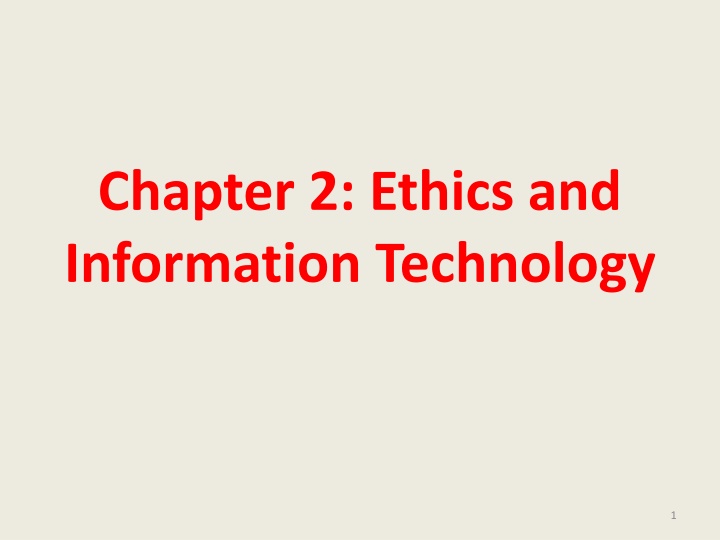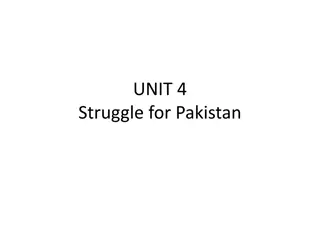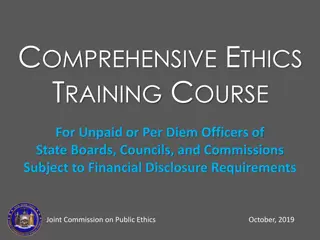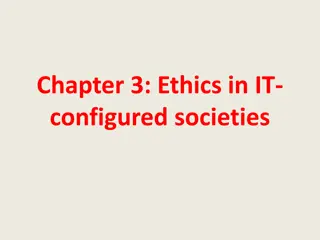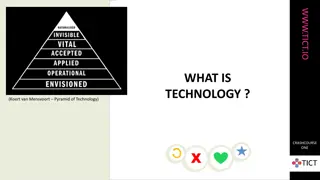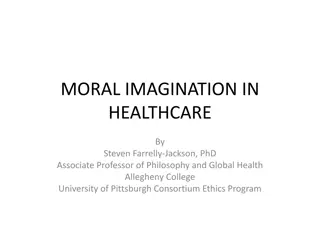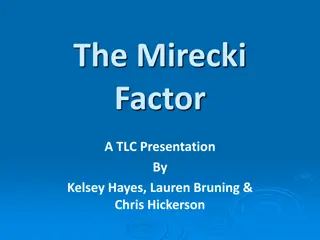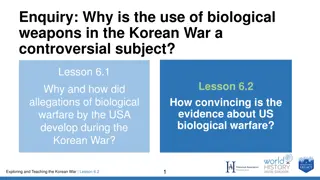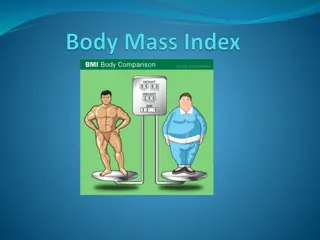Ethics and Information Technology: Controversy and Analysis
Ethics and Information Technology delve into the meaning of ethics, distinguishing between theoretical and practical ethics, with a focus on normative lenses, descriptive and normative claims, and the link between the two for evaluating social arrangements and human goals.
Download Presentation

Please find below an Image/Link to download the presentation.
The content on the website is provided AS IS for your information and personal use only. It may not be sold, licensed, or shared on other websites without obtaining consent from the author.If you encounter any issues during the download, it is possible that the publisher has removed the file from their server.
You are allowed to download the files provided on this website for personal or commercial use, subject to the condition that they are used lawfully. All files are the property of their respective owners.
The content on the website is provided AS IS for your information and personal use only. It may not be sold, licensed, or shared on other websites without obtaining consent from the author.
E N D
Presentation Transcript
Chapter 2: Ethics and Information Technology 1
Introduction: doing Ethics Controversy on the meaning of ethics A set of rules universally binding on all people at all time, moral rules deriving from some sort of transcendental authority Right and wrong actions Good and bad consequences Virtue or justice Distinction between theoretical and practical ethics: 2
Theoretical ethics focuses on giving an account of morality Practical ethics draws on theoretical ethics but is grounded in social practices in order to develop strategies for practical decision making We will adopt in this course a practical approach of ethics 3
Ethics is a normative lens through which to view choices and actions Study of computer ethics as a practical form of practical ethics Target: Ethical analysis of real situations in which IT plays a role 4
Descriptive/ Normative Descriptive claims: Claims about existing conditions in the world which can be verified or proven false by observing, making surveys and asking individuals E.g. Studies of cultures by anthropologists in which they describe complex moral rules in cultures they observed An examination of morality as an empirical phenomenon without any indication if it is right or wrong 5
Normative claims: They are prescriptive and evaluative Normative analysis consists in evaluating and critiquing states of affairs in search of ways to think about what was wrong or what would be better social arrangements Ethical analysis is directed at human goals: way of treating each other, notion of justice, fairness, 6
Link between descriptive and normative analysis: Empirical information may be helpful in identifying ways of thinking about a normative issue E.g. trying to find out why people believe that downloading proprietary music is okay may help to identify normative arguments 7
Normative beliefs can influence which and what kind of data we collect E.g. social scientists seek information about the generalization of the use of internet in the countries because they consider that the spread of the internet is an important phenomenon 8
The dialectic method Move from unreflective beliefs to claims that are connected to an acceptable principle Finding out the reasons individuals have to make a claim E.g. Why would anyone claim that censorship is wrong? Each individual has to give reasons for moral beliefs in order to examine and evaluate them 9
Individuals have to be consistent from a topic to another E.g. Dialectic method will lead an individual to recognize that being against abortion and capital punishment rests on 1 claim about the value of human life Dialectic method does not always lead to a final conclusion, nor to a unanimous agreement but to a better understanding 10
Outcome of this method: Learning weak/ strong arguments, Understanding the beliefs underpinning our moral beliefs Development of consistent beliefs Understanding interrelations between moral ideas Helping to sort out entirely unacceptable actions and distinguishing possible courses of actions with advantages and disadvantages 11
According to Whitbeck: Although no unique correct solution may exist, nonetheless, some possible responses are clearly unacceptable- there are wrong answers even if there is no unique right answer-and some solutions are better than others 12
Ethics is relative Ethical beliefs vary from a country to another, to the age and to the personality Is ethics is relative a descriptive or normative claim? Ethics is relative as a descriptive claim: The claim would be ethical beliefs, rules and practices vary from culture to culture and from time to time 13
Variation in what individuals and groups consider right and wrong E.g. apparition of a woman in public without her face covered in society, polygamy, bribery Moral norms vary over time, what was considered wrong at one time in a given society may be considered right at another time E.g. slavery Moral beliefs are largely influenced by when, where, how and by whom one is raised 14
Ethics is relative as a normative claim: The claim would be interpreted to mean that right and wrong are relative to the individual, non universal and depend on one s culture, when and where one is living ( relative to society) It also means that one should act in conformance with the rules of his society when in Rome, do as the Romans 15
Ethical Theories And Concepts Utilitarianism Ethical theory claiming that what makes behavior right or wrong depends wholly on the consequences What is important about human behavior is the outcome of it and not the intention a person has when he acts 16
Actions are good when they produce happiness and bad when they produce unhappiness Actions and rules are good because of their usefulness in bringing about good consequences 17
What is so valuable for human beings Distinction between Instrumental goods: They are valued because they lead to something else E.g. Money Intrinsic goods: They are valued for their own sake E.g. Knowledge, art 18
According to utilitarianism, happiness is the ultimate intrinsic good since everything else is desired to reach happiness E.g. Why did you choose to be a computer professional? Why do you care about being well paid? Why do you want a job in which you can be creative and autonomous?... Any discussion of what you seek in life and what is valuable will not stop until you get to happiness 19
Different versions of utilitarianism Rule-utilitarians argue that we should adopt rules that, if followed by everyone would in the long run maximize happiness E.g. tell the truth rule, keep your promises rule 20
Act-utilitarians focus on individual actions rather than rules They consider that individuals should try to anticipate the consequences of their actions They treat rules as general guidelines that could be abandoned in situations where more happiness will result from breaking them 21
Deontological theory Deontology derives from the Greek words deon= duty and logos= science science of duty They put the emphasis on the internal character of the act itself What makes the action right or wrong is the principle inherent in the action 22
If an action is done from a sense of duty, if the principle of the action can be universalized, then the action is right Kant s philosophy: One must always act according to the categorical imperative which is to treat the human being as an end in himself and never as a means to an end 23
Deontologists criticize utilitarians concerning fixation of happiness as good for humans For them, as rational beings, they are capable of reasoning about what they want to do and then deciding and acting to reach an end that is not happiness 24
The capacity of reasoning differentiates human beings from the rest since they decide how they will behave by giving themselves rules and following them They conform to a conception of law 25
For utilitarians, humans seek happiness For deontologists, humans are creatures with goals who engage activities directed toward achieving these goals 26
Rights Distinction between negative rights and positive rights Negative rights require restraint by others Positive rights require that others have a duty to do something to the right holder 27
Distinction between legal, moral, natural and human rights. Legal rights are created by law Moral natural or human rights are grounded in theories pertaining to morality and nature 28
Rights and social contract theory Main idea: Human beings live in a state of nature, which is a state of insecurity and uncertainty. This leads them to make a contract with society in order to join forces with others, give up some of their natural freedom in exchange for benefits of cooperation. They agree to abide by rules and refrain from certain actions and to give power to a government to enforce the rules 29
Many social contract theorists: Hobbes: Injustice and war in a state of nature John Locke: Existence of a natural form of justice in the state of nature, individuals have rights but treat sometimes other individuals unjustly Government is necessary to insure the implementation of nature justice properly 30
John Rawls: His main concern was the distributive justice. According to him, it is not possible to arrive to an account of justice and fairness of social arrangements by reasoning about what rules a group of individuals would agree to. Since individuals are self-interested, they will be influenced by their situations when they think about fair arrangements So, in the state of nature, the rules we would agree to would not necessarily be just 31
Virtue ethics Plato, Aristotle: What is a good person? Virtue Excellence Ethics Long list of virtues: courage, benevolence, generosity, honesty Resurrection of this philosophy Virtue theorists focus on the question of moral character ( What sort of character should we have?) 32
Application to computers and information technology What are the characteristics of a good computer professional? Honesty while dealing with clients Courage while facing situations in which he/she is pressured to act illegally or against public safety 33
Analogical reasoning in computer ethics Analogy to analyze a situation involving technology: Reasoning by analogy means considering a similar situation ( to an IT one) in which there is not a computer or IT and then examining whether the absence of technology makes a moral difference. 34
